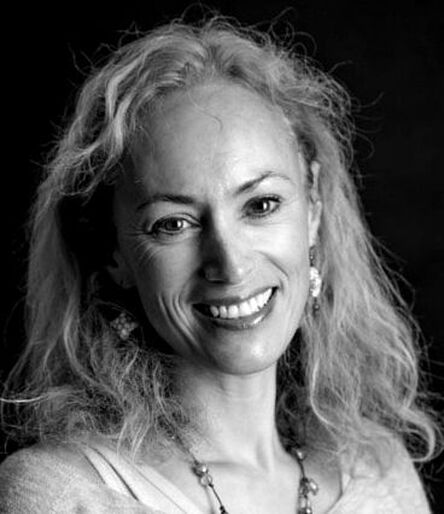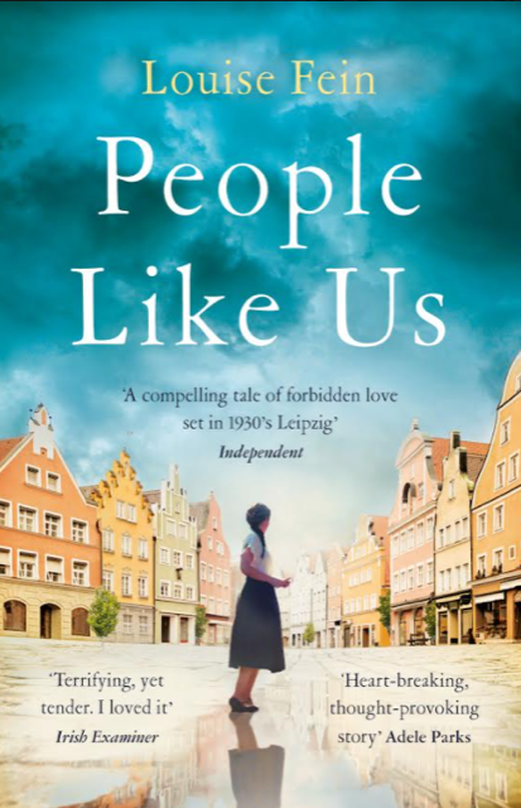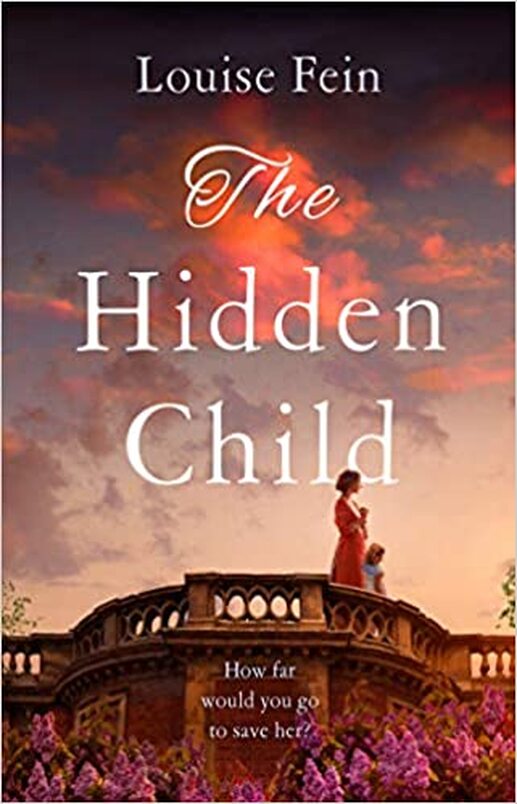
It is with very great pleasure that I welcome Louise Fein onto the website today. Louise writes historical fiction and her debut novel People Like Us was shortlisted for the RSL Christopher Bland Prize 2021, the RNA Goldsboro Books Historical Romantic Novel Award 2021, and was longlisted for the Not The Booker Prize 2020. It is being translated into eleven foreign languages.
Alex: Tell me a bit about yourself, Louise.
Louise: I was brought up on the outskirts of London, a proper English girl. My Dad, however, was a refugee, having arrived from Nazi Germany (he was a German Jew) in the 1930s. My mother is English and his second wife, much younger than him. His ‘former’ life was never talked about and I somehow felt it was something which had to be hidden and kept secret, or our family may be in danger. He died when I was only seventeen so I never really got the chance to speak to him about it. It was really only when I began writing my debut novel, People Like Us (Daughter of the Reich in the US and Canada) that I went to Leipzig (where my Dad was from) and learned about the family history and the wider story of the Jewish history of the city. I’ve always wanted to be a writer - ever since I became an avid reader. My first ‘book’ was a story about ponies aged around seven. In a nod to my seven-year-old self, a pony, Dilly, has a minor part in my latest book, The Hidden Child. When I’m not writing or reading, I am a slave to my pets. I live with my family in the Surrey countryside and enjoy running, cycling and in non-Covid times, travel and trips to London for a culture-fix.
Alex: How would you describe your writing, and are there particular themes that you like to explore?
Louise: I write historical fiction, however, I try to have themes in my books which resonate with a modern readership and are also relevant today, for example, populism, propaganda, misogyny, racism, class. I like to look at issues or events from unusual angles. So in my first book, the story is told from the perspective of a young girl who has fully bought into the Nazi dream. My next book, which looks at the Eugenics movement in the 1920’s tells the story from the point of view of a couple who are prominent eugenicists.
Alex: Tell me a bit about yourself, Louise.
Louise: I was brought up on the outskirts of London, a proper English girl. My Dad, however, was a refugee, having arrived from Nazi Germany (he was a German Jew) in the 1930s. My mother is English and his second wife, much younger than him. His ‘former’ life was never talked about and I somehow felt it was something which had to be hidden and kept secret, or our family may be in danger. He died when I was only seventeen so I never really got the chance to speak to him about it. It was really only when I began writing my debut novel, People Like Us (Daughter of the Reich in the US and Canada) that I went to Leipzig (where my Dad was from) and learned about the family history and the wider story of the Jewish history of the city. I’ve always wanted to be a writer - ever since I became an avid reader. My first ‘book’ was a story about ponies aged around seven. In a nod to my seven-year-old self, a pony, Dilly, has a minor part in my latest book, The Hidden Child. When I’m not writing or reading, I am a slave to my pets. I live with my family in the Surrey countryside and enjoy running, cycling and in non-Covid times, travel and trips to London for a culture-fix.
Alex: How would you describe your writing, and are there particular themes that you like to explore?
Louise: I write historical fiction, however, I try to have themes in my books which resonate with a modern readership and are also relevant today, for example, populism, propaganda, misogyny, racism, class. I like to look at issues or events from unusual angles. So in my first book, the story is told from the perspective of a young girl who has fully bought into the Nazi dream. My next book, which looks at the Eugenics movement in the 1920’s tells the story from the point of view of a couple who are prominent eugenicists.

Alex: Are you a writer that plans a detailed synopsis or do you set out with a vague idea and let the story unfold as you write?
Louise: I’m definitely a pantser, although I wish I was a planner! I really admire people who can plan novels from start to finish, but sadly I’m not one of them. I usually start with a theme and a vague idea for a story, setting it in an appropriate time and place (I write historical fiction, thus far set in the 20th century). I do some general research and by the time I start, I have an idea for the beginning and usually how it ends, but it will take me several drafts to get to know my characters and what happens in the middle. Additional storylines come from drafting and characters often behave in ways I’m not expecting, or new characters pop up. I find not having a detailed plan freeing because I can explore and experiment but equally it does mean I end up going down some routes which turn out to be dead-ends. As I’m writing I’ll continue researching, the research getting more and more detailed and specific as I hone the story.
Alex: Tell us about your latest novel.
Louise: My new novel which is to be published in the UK on 2nd September 2021 in ebook, audio and hardback, and the US/Canada in all formats on 19th October, is called The Hidden Child. Set in London in 1928 and 1929, Eleanor Hamilton is happily married and mother to a beautiful four-year-old daughter, Mabel. Her wealthy husband, Edward, a celebrated war hero, is a leading light in the burgeoning Eugenics movement and is increasingly important in designing education policy for the nation. But when Mabel begins to develop debilitating epileptic seizures, their world fractures. Her shameful illness must be hidden or Edward’s life’s work will be in jeopardy and the family’s honour shattered. When Eleanor discovers Edward has been keeping secrets, she calls into question everything she believed about genetic inferiority and her previously unshakeable faith in her husband disintegrates. Alarmed and distressed, she must decide whether to risk everything by taking matters into her own hands.
Louise: I’m definitely a pantser, although I wish I was a planner! I really admire people who can plan novels from start to finish, but sadly I’m not one of them. I usually start with a theme and a vague idea for a story, setting it in an appropriate time and place (I write historical fiction, thus far set in the 20th century). I do some general research and by the time I start, I have an idea for the beginning and usually how it ends, but it will take me several drafts to get to know my characters and what happens in the middle. Additional storylines come from drafting and characters often behave in ways I’m not expecting, or new characters pop up. I find not having a detailed plan freeing because I can explore and experiment but equally it does mean I end up going down some routes which turn out to be dead-ends. As I’m writing I’ll continue researching, the research getting more and more detailed and specific as I hone the story.
Alex: Tell us about your latest novel.
Louise: My new novel which is to be published in the UK on 2nd September 2021 in ebook, audio and hardback, and the US/Canada in all formats on 19th October, is called The Hidden Child. Set in London in 1928 and 1929, Eleanor Hamilton is happily married and mother to a beautiful four-year-old daughter, Mabel. Her wealthy husband, Edward, a celebrated war hero, is a leading light in the burgeoning Eugenics movement and is increasingly important in designing education policy for the nation. But when Mabel begins to develop debilitating epileptic seizures, their world fractures. Her shameful illness must be hidden or Edward’s life’s work will be in jeopardy and the family’s honour shattered. When Eleanor discovers Edward has been keeping secrets, she calls into question everything she believed about genetic inferiority and her previously unshakeable faith in her husband disintegrates. Alarmed and distressed, she must decide whether to risk everything by taking matters into her own hands.

Alex: What was the first book you read?
Louise: I can’t remember the first book, but the first author I loved was Enid Blyton and her Famous Five series. I could barely put them down and from that then on I was rarely without my nose in a book. I remember a teacher at school being disdainful about Enid Blyton and she told my mother I should be reading books of better quality. My mother merely shrugged and said she didn’t care what I read as long as it was something. She was right. When I was ready, I moved on of course, and I think forcing children to read things they have no interest in is counter-productive.
Alex: How much research do you do and what does it usually entail?
Louise: I do a lot of research as I write historical fiction and I think that is unavoidable! I love it though, so it is as enjoyable as the writing process. That said, probably 95% of the research I do never makes it into the books. I read generally around subjects first, both fiction and non-fiction. As the story develops in my mind, the research becomes more specific. I also try to find as much first hand, contemporaneous material I can. When writing my debut, People Like Us, I was lucky to have given to me twenty four boxes of family papers, including letters, diaries and official documents amongst other items written in the first half of the twentieth century. It was such an invaluable resource because I could understand how people felt at the time, without the benefit of hindsight.
Alex: Do you ever base your characters on people you have encountered in real life?
Louise: Not knowingly, but I suppose it happens subconsciously. My characters are probably a composite of traits of various people I have come across over the years!
Alex: Which was the last book you read that blew you away?
Louise: I think Where the Crawdads Sing by Delia Owens. The writing was absolutely exquisite and I was completely transported to the marshlands of North Carolina. It’s a beautiful book and a total page turner. I had no idea how it was going to end.
Alex: Which authors do you particularly admire and why?
Louise: I’m a huge fan of Kate Atkinson. I love her humour, perspective on life and writing. I also love the diversity of her work from literary to crime - there is an assumption that authors stick to one genre, and I would love to write in many different forms as I love to read different genres. I also love Khaled Hosseini whose books have two things I love - a strong emotional core and the ability to transport the reader into a time and place so different to my own. I love Maggie O’Farrell, again for her writing but also her observations on humanity and Barbara Kingsolver for being an all-round brilliant writer and for the fascinating subject matter of all of her books. I could name many more but will stop there!
Alex: Thank you so much Louise for sharing this with us. Where the Crawdads Sing has been on my list of books to read since my wife's book group read it last year and universally loved it. Needless to say, your books are now on my list, too. I have already read great things about People Like Us and look forward to reading it. I have something of a soft spot for novels set during WWII. Anyway, good luck with your latest book, which also sounds really interesting. And thanks again for taking part.
Louise: It's my pleasure, Alex. Thank you for inviting me.
Louise: I can’t remember the first book, but the first author I loved was Enid Blyton and her Famous Five series. I could barely put them down and from that then on I was rarely without my nose in a book. I remember a teacher at school being disdainful about Enid Blyton and she told my mother I should be reading books of better quality. My mother merely shrugged and said she didn’t care what I read as long as it was something. She was right. When I was ready, I moved on of course, and I think forcing children to read things they have no interest in is counter-productive.
Alex: How much research do you do and what does it usually entail?
Louise: I do a lot of research as I write historical fiction and I think that is unavoidable! I love it though, so it is as enjoyable as the writing process. That said, probably 95% of the research I do never makes it into the books. I read generally around subjects first, both fiction and non-fiction. As the story develops in my mind, the research becomes more specific. I also try to find as much first hand, contemporaneous material I can. When writing my debut, People Like Us, I was lucky to have given to me twenty four boxes of family papers, including letters, diaries and official documents amongst other items written in the first half of the twentieth century. It was such an invaluable resource because I could understand how people felt at the time, without the benefit of hindsight.
Alex: Do you ever base your characters on people you have encountered in real life?
Louise: Not knowingly, but I suppose it happens subconsciously. My characters are probably a composite of traits of various people I have come across over the years!
Alex: Which was the last book you read that blew you away?
Louise: I think Where the Crawdads Sing by Delia Owens. The writing was absolutely exquisite and I was completely transported to the marshlands of North Carolina. It’s a beautiful book and a total page turner. I had no idea how it was going to end.
Alex: Which authors do you particularly admire and why?
Louise: I’m a huge fan of Kate Atkinson. I love her humour, perspective on life and writing. I also love the diversity of her work from literary to crime - there is an assumption that authors stick to one genre, and I would love to write in many different forms as I love to read different genres. I also love Khaled Hosseini whose books have two things I love - a strong emotional core and the ability to transport the reader into a time and place so different to my own. I love Maggie O’Farrell, again for her writing but also her observations on humanity and Barbara Kingsolver for being an all-round brilliant writer and for the fascinating subject matter of all of her books. I could name many more but will stop there!
Alex: Thank you so much Louise for sharing this with us. Where the Crawdads Sing has been on my list of books to read since my wife's book group read it last year and universally loved it. Needless to say, your books are now on my list, too. I have already read great things about People Like Us and look forward to reading it. I have something of a soft spot for novels set during WWII. Anyway, good luck with your latest book, which also sounds really interesting. And thanks again for taking part.
Louise: It's my pleasure, Alex. Thank you for inviting me.
